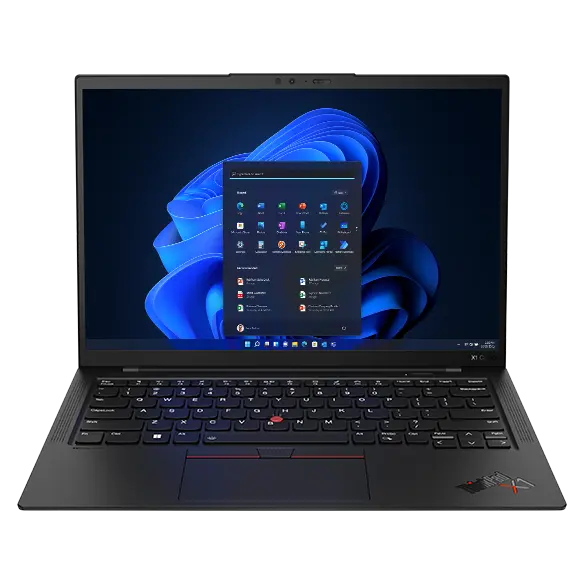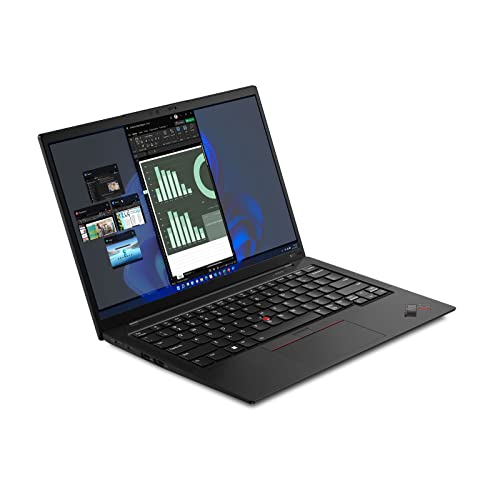AMD processors are far behind Qualcomm, Intel, and Apple in battery life. Here's why.
For now, AMD is behind in battery life compared to Qualcomm, Intel, and Apple. But how far behind exactly?
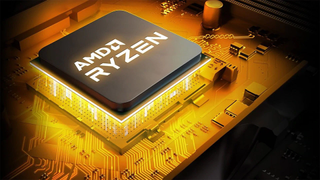
Lately, we've seen AMD-powered laptops struggle with battery life compared to the competition — so what exactly is going on?
I recently reviewed the new Lenovo Yoga 7 2-in-1, powered by the AMD Ryzen 7 8840HS processor. However, I was disappointed by the eight hours and two minutes of longevity on the Laptop Mag battery life test, which involves continuous web surfing over wifi at 150 nits.
Now, I would normally dismiss this as merely an inefficient laptop, but I couldn't this time.
I had just reviewed the Intel-powered version of the same laptop a week earlier, the Lenovo Yoga 7i 2-in-1 (the "I" is for Intel). And with the Intel laptop, I had a far better experience.
Those two laptops are identical in nearly every respect, yet Intel pulled ahead with 12 hours and 57 minutes of battery life, five hours longer than the AMD version. Both have the same 71Wh battery. This near-five-hour discrepancy in battery life is one any laptop user may question, too.
With this significant disparity in mind, Laptop Mag studied a larger sample size of AMD-powered productivity laptops and compared them to Apple, Qualcomm, and Intel-powered laptops. The results weren’t pretty for AMD.
Digging into AMD's lackluster battery life
Out of the six AMD-powered productivity laptops we’ve reviewed in the last 12 months that do not feature a discrete graphics processing unit (GPU), just one exceeded 10 hours of battery life.
Stay in the know with Laptop Mag
Get our in-depth reviews, helpful tips, great deals, and the biggest news stories delivered to your inbox.
That one standout is the Asus Zenbook S16, which lasted 11 hours and 35 minutes on the Laptop Mag battery test. (The test amounts to continuous web surfing over wifi at 150 nits of brightness.)
Below is the full list of the six AMD-powered productivity laptops that Laptop Mag has reviewed in the last 12 months, ranked in order of battery longevity:
| Laptop | AMD Processor | Battery Life |
|---|---|---|
| Asus Zenbook S16 UM5606 | Ryzen AI 9 HX 370 | 11:35 |
| 15-inch HP Envy x360 2-in-1 | Ryzen 7 5825U | 9:52 |
| HP Envy x360 2-in-1 | Ryzen 7 7730U | 9:17 |
| Lenovo Yoga 7 2-in-1 | Ryzen 7 8840HS | 8:02 |
| Acer Swift Edge 16 | Ryzen 7 7840U | 7:18 |
| Lenovo IdeaPad 5 2-in-1 | Ryzen 7 8845HS | 6:26 |
The average battery life of the six laptops above is 8 hours, 45 minutes.
The worst of the bunch is the Lenovo IdeaPad 5 2-in-1, which has a battery life of 6 hours and 26 minutes, which is awful for a laptop without a dedicated GPU.
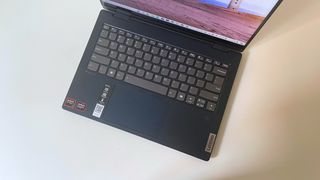
When I realized that the Lenovo IdeaPad 5 2-in-1 laptop, which has abysmal battery life, was powered by the same AMD Radeon 780M integrated graphics seen in the Lenovo Yoga 7 2-in-1, I wondered if something about this chip was draining tons of power from the battery. After all, this is the laptop that started me on this frantic search for answers.
It's no secret that AMD boasts the strongest integrated graphics in its chips. So Laptop Mag contacted AMD to see if the company could comment on why its battery life is so behind the competition.
We contacted AMD to figure out the cause
Stacy MacDiarmid, Senior Manager of Public Relations at AMD, says that the relatively short battery life aligns with the company's expectations for its chips.
"The Intel processor is a U series designed for energy efficiency and everyday performance, while the AMD HS processor is designed to deliver top-of-the-line performance for more demanding workloads like gaming and content creation,” MacDiarmid tells Laptop Mag via email.
As a result of the AMD chip claiming stronger integrated graphics performance, its efficiency will decrease, and battery life will be reduced faster.
“With more advanced integrated graphics, you can also expect to see a notable difference in battery consumption," MacDiarmid explains, adding that in designing the chip, the company tries "to balance benefits and tradeoffs to deliver processors that meet the needs of customers today and in the future."
MacDiarmid added that AMD's new Ryzen AI 300 series processors will deliver “the performance our customers expect, with greater efficiency than previous generations." It's an assertion Laptop Mag's own testing can confirm.
We know that Lenovo Yoga 7 2-in-1 has a relatively short battery life because AMD says that's not the focus — the focus is on graphic performance. So, how much of an improvement does the Yoga 7 2-in-1 deliver in integrated graphics?
Graphics and its impact on battery life
Since both the Lenovo Yoga 7 2-in-1 and Lenovo IdeaPad 5 2-in-1 share the same integrated GPU, I checked to see if their scores in the graphics category were higher than those of other AMD chips.
We played Sid Meier’s Civilization V: Gathering Storm, and the Yoga 7 2-in-1 managed 48 frames per second at 1080p with its AMD Ryzen 7 8840HS. And the AMD-powered Lenovo IdeaPad 5 2-in-1 hit the same 48 fps.
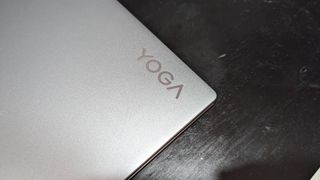
The Asus Zenbook S16, a laptop with more than 11 hours of battery life, boasted 63 fps. It's powered by an AMD Ryzen AI 9 HX 370 with AMD Radeon 890M integrated graphics. So, the testing data shows that impressive graphics performance and long battery life can still be achieved. It just comes down to the chip's efficiency.
Testing data shows that impressive graphics performance and long battery life can still be achieved. It just comes down to the chip's efficiency.
On the 3DMark Fire Strike synthetic benchmark, the Yoga 7 2-in-1 (7,729) and IdeaPad 5 2-in-1 (7,851) continued to perform similarly. But the Zenbook S16’s synthetic performance wasn’t better than either laptop, coming in at 7,468.
So, what about the graphics performance in the Lenovo Yoga 7i 2-in-1, which lasted five hours longer than its AMD counterpart? The answer is unsurprising due to its weaker integrated graphics, as it's bogged down by significantly worse game performance, achieving 26 fps on the same Sid Meier’s Civilization VI: Gathering Storm test. Alongside its 3DMark Fire Strike synthetic benchmark score of 5,010, it's clear that AMD is far ahead in this regard.
Processors like the AMD Ryzen AI 9 HX 370 prove that you can have the best of both worlds.
AMD pushes for stronger graphics in its chips, which negatively affects battery life. But processors like the AMD Ryzen AI 9 HX 370 prove that you can have the best of both worlds.
For now, AMD is behind in battery life compared to Qualcomm, Intel, and Apple. But how far behind exactly?
Let's examine each of these processors in terms of battery life and see which one comes on top.
AMD battery life vs. Qualcomm, Intel, and Apple
Qualcomm’s Snapdragon X Elite laptops are still pretty new, but we’ve already reviewed six, and even the worst performing of the bunch boasts battery life that surpasses what the best AMD has to offer. Laptop compiled an average battery life of 14 hours and 59 minutes from these six laptops:
| Laptop | Qualcomm Processor | Battery life |
|---|---|---|
| Dell XPS 13 9345 | Snapdragon X Elite X1E-80-100 | 19:01 |
| HP EliteBook Ultra | Snapdragon X Elite XIE78-100 | 16:01 |
| Microsoft Surface Laptop 7th Edition | Snapdragon X Elite X1E80100 | 15:44 |
| Lenovo Yoga Slim 7x | Snapdragon X Elite X1E-78-100 | 14:01 |
| Asus Vivobook S15 S5507 | Snapdragon X Elite X1E-78-100 | 12:53 |
| Microsoft Surface Pro 11th Edition | Snapdragon X Elite X1E-80-100 | 12:11 |
MacBook is by far the most consistent in longevity, with us coming to an average of 16 hours and 24 minutes of battery life from the last four MacBook’s Laptop has reviewed:
| Laptop | Apple Processor | Battery life |
|---|---|---|
| MacBook Pro 16-inch | M3 Max | 18:05 |
| MacBook Pro 14-inch | M3 | 17:16 |
| MacBook Air 13-inch | M3 | 15:13 |
| MacBook Air 15-inch | M3 | 15:03 |
Laptop staffers have reviewed many Intel laptops, so we will use a larger sample size this time. We saw an average battery life of 11 hours and 20 minutes from the 10 Intel-powered productivity laptops we’ve reviewed without a discrete GPU:
| Laptop | Intel Processor | Battery life |
|---|---|---|
| Asus Zenbook 14 | Core Ultra 7 155H | 15:52 |
| Dell Inspiron 14 Plus | Core Ultra 7 155H | 15:06 |
| Lenovo Yoga 7i 2-in-1 | Core Ultra 5 125U | 12:57 |
| Lenovo Yoga 7i Gen 9 | Core Ultra 5 125U | 11:24 |
| Asus Zenbook Duo | Core Ultra 7 155H | 10:34 |
| Lenovo Slim 7i | Core Ultra 7 155H | 10:03 |
| HP Envy x360 2-in-1 | Core Ultra 7 155U | 9:49 |
| Lenovo ThinkPad X1 2-in-1 Gen 9 | Core Ultra 7 155U | 9:47 |
| Lenovo ThinkPad X1 Carbon Gen 12 | Core Ultra 7 155H | 9:27 |
| Acer Swift Go 14 | Core Ultra 7 155H | 8:25 |
From the information above, which is exclusively limited to the laptops we’ve reviewed recently, here’s our conclusion of average battery life in non-gaming laptops from processor type:
1. Apple: 16 hours and 24 minutes
2. Qualcomm: 14 hours and 59 minutes
3. Intel: 11 hours and 20 minutes
4. AMD: 8 hours and 45 minutes
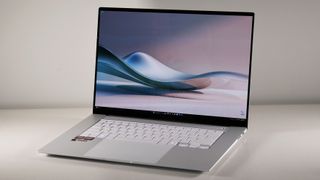
Remember, this isn’t a holistic overview of the battery life on these chips, as it is limited to what we’ve tested. Based on that, AMD is so far behind the rest of the competition in longevity, and even when compared to Intel’s pretty wide range (anywhere from 8 to 16 hours), it’s not even close.
AMD claims that its Ryzen AI 300 will deliver even greater battery life than previous generations. As the Zenbook S16 has the longest battery life of any AMD laptop we’ve tested in the last year, this is in line with the company's claims.
The culprit revolves around AMD’s stronger integrated graphics, and the consumer must decide whether to accept improved performance over weaker battery life.
It's no secret that gaming laptops absolutely sap battery life from these machines, but when it comes to productivity laptops, the benefit of slightly superior gaming performance over significantly weaker longevity is up in the air.
We would rarely recommend AMD integrated graphics to most gamers, so it's hard to say it's worth battery life that lasts hours less. However, that seems to be changing, and we're hoping future Ryzen processors continue to improve upon longevity while maintaining its greater power.

Self-described art critic and unabashedly pretentious, Claire finds joy in impassioned ramblings about her closeness to video games. She has a bachelor’s degree in Journalism & Media Studies from Brooklyn College and five years of experience in entertainment journalism. Claire is a stalwart defender of the importance found in subjectivity and spends most days overwhelmed with excitement for the past, present and future of gaming. When she isn't writing or playing Dark Souls, she can be found eating chicken fettuccine alfredo and watching anime.







